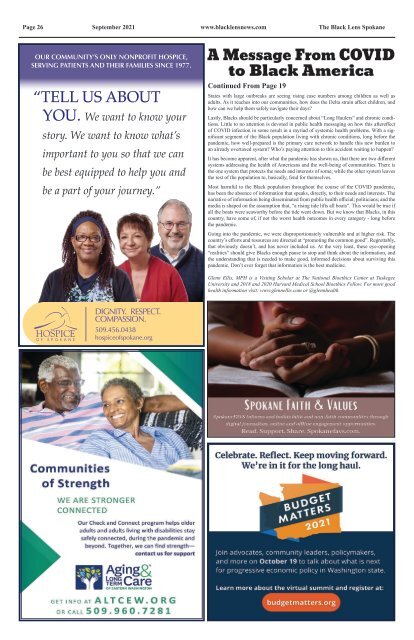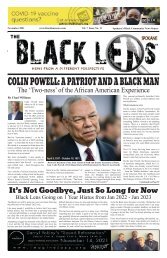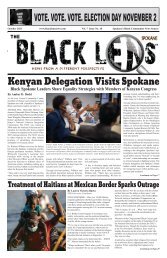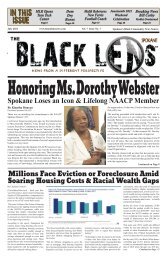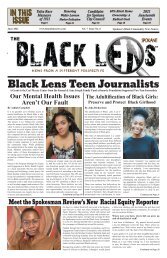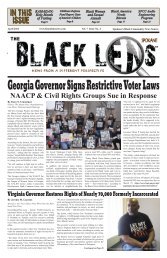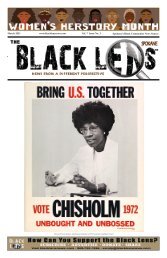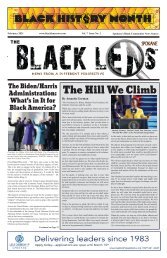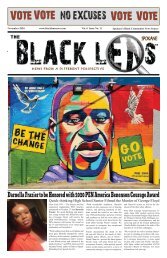Black Lens - September 2021
The Black Lens is an independent community newspaper published monthly that is based in Spokane, WA. It covers the news, issues, people and events that are of importance to the Black community.
The Black Lens is an independent community newspaper published monthly that is based in Spokane, WA. It covers the news, issues, people and events that are of importance to the Black community.
Create successful ePaper yourself
Turn your PDF publications into a flip-book with our unique Google optimized e-Paper software.
Page 26<br />
<strong>September</strong> <strong>2021</strong><br />
www.blacklensnews.com<br />
The <strong>Black</strong> <strong>Lens</strong> Spokane<br />
OUR COMMUNITY’S ONLY NONPROFIT HOSPICE,<br />
SERVING PATIENTS AND THEIR FAMILIES SINCE 1977.<br />
“TELL US ABOUT<br />
YOU. We want to know your<br />
story. We want to know what’s<br />
important to you so that we can<br />
be best equipped to help you and<br />
be a part of your journey.”<br />
A Message From COVID<br />
to <strong>Black</strong> America<br />
Continued From Page 19<br />
States with large outbreaks are seeing rising case numbers among children as well as<br />
adults. As it reaches into our communities, how does the Delta strain affect children, and<br />
how can we help them safely navigate their days?<br />
Lastly, <strong>Black</strong>s should be particularly concerned about “Long Haulers” and chronic conditions.<br />
Little to no attention is devoted in public health messaging on how this aftereffect<br />
of COVID infection in some result in a myriad of systemic health problems. With a significant<br />
segment of the <strong>Black</strong> population living with chronic conditions, long before the<br />
pandemic, how well-prepared is the primary care network to handle this new burden to<br />
an already overtaxed system? Who’s paying attention to this accident waiting to happen?<br />
It has become apparent, after what the pandemic has shown us, that there are two different<br />
systems addressing the health of Americans and the well-being of communities. There is<br />
the one system that protects the needs and interests of some; while the other system leaves<br />
the rest of the population to, basically, fend for themselves.<br />
Most harmful to the <strong>Black</strong> population throughout the course of the COVID pandemic,<br />
has been the absence of information that speaks, directly, to their needs and interests. The<br />
narrative of information being disseminated from public health official; politicians; and the<br />
media is shaped on the assumption that, “a rising tide lifts all boats”. This would be true if<br />
all the boats were seaworthy before the tide went down. But we know that <strong>Black</strong>s, in this<br />
country, have some of, if not the worst health outcomes in every category - long before<br />
the pandemic.<br />
Going into the pandemic, we were disproportionately vulnerable and at higher risk. The<br />
country’s efforts and resources are directed at “promoting the common good”. Regrettably,<br />
that obviously doesn’t, and has never included us. At the very least, these eye-opening<br />
“realities” should give <strong>Black</strong>s enough pause to stop and think about the information, and<br />
the understanding that is needed to make good, informed decisions about surviving this<br />
pandemic. Don’t ever forget that information is the best medicine.<br />
Glenn Ellis, MPH is a Visiting Scholar at The National Bioethics Center at Tuskegee<br />
University and 2018 and 2020 Harvard Medical School Bioethics Fellow. For more good<br />
health information visit: www.glennellis.com or @glennhealth<br />
DIGNITY. RESPECT.<br />
COMPASSION.<br />
509.456.0438<br />
hospiceofspokane.org


